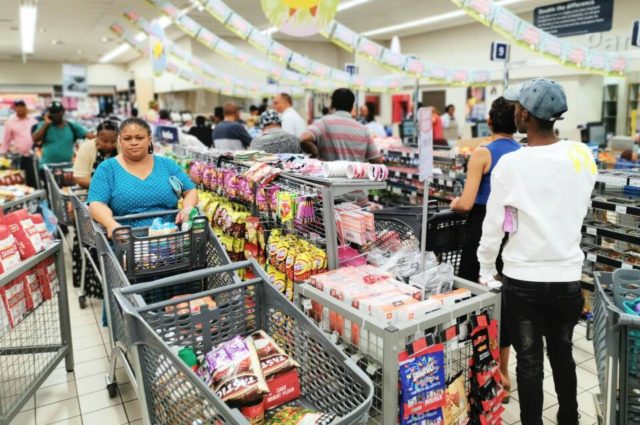The long queues in supermarket aisles made a mockery of maintaining physical distancing.
DESPITE assurances that food supply will not be interrupted during the 21-day lockdown, shell-shocked city residents flocked to local supermarkets, many waiting in the morning for the doors to open.
While President Cyril Ramaphosa asked South Africans not to flock to stores in a panic-buying frenzy, his message did not hit home as some citizens went against his advice.
The long queues in supermarket aisles made a mockery of maintaining physical distancing.
Several supermarkets quickly ran low on various items, especially fresh vegetables and meat, as well as long-life items, and staff desperately tried to unpack to keep the shelves full.
Pick * Pay Rhodesdene sent a message to its customers, informing them that the store has been classified as an essential service provider and will therefore keep trading. It pointed out that stock was received from its distribution centre daily so there was no need for panic buying.
“We receive stock from our Pick * Pay distribution centre daily, so no need for panic buying! There have been reports of out of stock items in some of our stores due to panic buying after the president’s speech on the 21-day lockdown starting on Thursday night. We can assure you that we receive trucks every day. Please think of others.”
Minister of Agriculture Thoko Didiza attempted to assure the public, afraid of facing empty shelves, that the supply of food will not be interrupted during the 21-day national lockdown.
Didiza stated that the entire food value chain – from farming, manufacturing, transporting and retail of food products – would go uninterrupted.
“Several businesses will be affected, but the agriculture and food supply sector is one of the essential systems for livelihood and therefore will remain operational. Our food supply system will remain functional during this period. Agricultural production in all its forms will remain uncompromised. This includes all services, including provision of veterinary and advisory services.”
She added that live auctions of livestock and sale of other agricultural commodities would continue but under strict conditions.
“Exports and imports of critical agriculture commodities and the logistical measures will continue during this lockdown period to ensure global and national food security.”
To ensure that consumers are not punished with inflated prices, Didiza warned that food price monitoring will be conducted on critical food basket commodities and reports will be given to the nation on a regular basis.
“The department has set aside a package of R1.2 billion to address the effects of the coronavirus and ensure sustainable food production post the pandemic.”
The department has also availed R100 million to the Land Bank to assist farmers under distress.
“I appeal to the public not to embark on panic buying. The country has sufficient food supplies. Panic buying will only cause disruptions and inconvenience in the food system.”
Didiza further warned wholesalers and retailers not to engage in price gouging. “You have an important role to play in the supply of food, and the fight against Covid-19. We ask that you continue to serve the nation and help ensure food security at this critical juncture.”
The National Red Meat Producers Organisation (RPO) confirmed that red meat production would continue in the 21-day exclusion period.
Chairman Koos van der Ryst explained that this would include essential activities such as slaughter, value chain supply actions, veterinary and phytosanitary services and production related actions such as feed supply and water supply.
“We, as red meat producers, want to assure the public that we will continue to produce and that there is no need for fear. Fortunately, most of South Africa is blessed with good rain that supports red meat production”, said Van der Ryst.
According to the RPO, at this stage demand for red meat locally is still strong and export markets continue to be normal. More than 95% of lamb, sheep and beef production is consumed locally.








